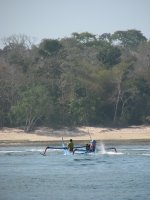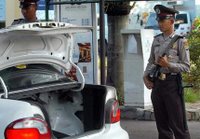Siargoa
 October 20, 2006
October 20, 2006Adam and I are in Siargao Island in the Western Pacific, home to the famous wave of Cloud Nine. The Philippines are a breath of fresh air after Indonesia. Most people here speak English, and although just as poor, it is more westernized and things just seem to work in a more logical fashion here. The Island itself is a tropical gem,
as beautiful as any South Pacific island...its
waters being as clear as a swimming pool...its reef breaks being world class when on. Our last few days in Bali, we met a couple of Australian guys who had just came from Siargao, and they dialed us in with a contact and a place to stay. Our contact man Junior Gonzales met us at the ferry terminal and took us to the north shore of the island to a small town called Pacifico. We rented a small house on the beach for $10 a night.....a short walk to a world class left hand reef pass. Our hostess Neng Neng lives in the house with her cousin, and they cook and clean for us for $10/week.


The amazing thing about this part of the island is that there are zero crowds. The daily line-up consists of Adam, me, and the local kid named Dong Dong. It's a pure surfing experience up here, no negative energy, just a bunch of stoked groms who are beginning to ride waves on discarded


In comparison, the town of General Luna (cloud 9) is packed with a motley crew of international surfers and it is very crowded...but luckily they rarely make it up north. Within a 30 mile stretch of coast we can access about 6 insane set ups.
 The village of Pacifico is very small, maybe 100 people, and very quiet except for the Videoke (Karaoke). You see, videoke is huge in the Philippines, and what they love to sing is cheesy American love ballads. Yes, think of the most god awful love ballad, the kind that sticks in your head all day and drives you crazy. In small villages like Pacifico, an enterprising family will buy a machine and it will serve as the principle form of entertainment for the town. The first few nights were a blast, we would drink 40 oz of San Miguel beer and find crazy songs to sing for the village (ebony and ivory duet, “The Gambler”, “Roxane”, Whitesnake, “Just the good old boys”, and plenty of redneck stuff) and they would just look at us like we were crazy.
The village of Pacifico is very small, maybe 100 people, and very quiet except for the Videoke (Karaoke). You see, videoke is huge in the Philippines, and what they love to sing is cheesy American love ballads. Yes, think of the most god awful love ballad, the kind that sticks in your head all day and drives you crazy. In small villages like Pacifico, an enterprising family will buy a machine and it will serve as the principle form of entertainment for the town. The first few nights were a blast, we would drink 40 oz of San Miguel beer and find crazy songs to sing for the village (ebony and ivory duet, “The Gambler”, “Roxane”, Whitesnake, “Just the good old boys”, and plenty of redneck stuff) and they would just look at us like we were crazy.Karaoke was great fun until about day four. The town was filled with teenage girls who would sing all day and into the evening, the same songs over and over again. The songs would stick in my head and it got so bad that I would sing the songs while I surfed- and this definitely had a

"The closer I get to loving you, the closer I get to touching you,
Just a “letle” more time just a “letle” more time and we will be closer......"
We were also being constantly harassed by a couple of teenage girls who had "crushes" on us, giving us love notes and singing songs for us.
 So we went to General Luna in search of some transport so we could be mobile and explore the island. Well we found a motorcycle for rent, and let me tell you, nothing symbolizes freedom more than the Huble Huble. The Huble Huble is the quintessential form of transportation (after the Jeepney and the tricycle) in Siargao. It is a workhorse, a big heavy Yamaha motorcycle with a long banana seat capable of transporting a family of six. It’s common to see a whole family chugging down the road, babies in hand, people hanging off the side, a kid sitting on the gas tank.
So we went to General Luna in search of some transport so we could be mobile and explore the island. Well we found a motorcycle for rent, and let me tell you, nothing symbolizes freedom more than the Huble Huble. The Huble Huble is the quintessential form of transportation (after the Jeepney and the tricycle) in Siargao. It is a workhorse, a big heavy Yamaha motorcycle with a long banana seat capable of transporting a family of six. It’s common to see a whole family chugging down the road, babies in hand, people hanging off the side, a kid sitting on the gas tank.The Huble Huble is also used to transport cargo like copra (dried /smoked coconut), fish, lumber...you name it. It took me the hour long trip back to Pacifico
Neng Neng prepares the squid
Grooming-a favorite pastime of Siargao
 One surfless Sunday we jumped on the hubble hubble with Dong Dong and headed to the far north of the island in search of some action. We stumbled upon a sunday cockfighting extravaganza at a place known as the "Cockpit". Cockfighting is the number one sport in the Philippines, especially in the small villages. It is a man's domain for sure, and they take it very seriously. Our man Dong Dong was our guide, and he led us through the gauntlet of men, who were placing bets and showing off their cock’s attributes. Harsh stares and glares of suspicion were quickly replaced with smiles and words of welcome; the Pinoy men were proud to share their tradition with Joe and Joe. Dong Dong led us to a back room that revealed a gladiators pit surrounded by empty bleachers. We took our seat and were soon approached by the big man. In his hands, wedged between each pair of knuckles, were folded up squares of peso notes, each representing a different bet. Behind him the men all began to file in from the front room and took their seats in the bleachers.
One surfless Sunday we jumped on the hubble hubble with Dong Dong and headed to the far north of the island in search of some action. We stumbled upon a sunday cockfighting extravaganza at a place known as the "Cockpit". Cockfighting is the number one sport in the Philippines, especially in the small villages. It is a man's domain for sure, and they take it very seriously. Our man Dong Dong was our guide, and he led us through the gauntlet of men, who were placing bets and showing off their cock’s attributes. Harsh stares and glares of suspicion were quickly replaced with smiles and words of welcome; the Pinoy men were proud to share their tradition with Joe and Joe. Dong Dong led us to a back room that revealed a gladiators pit surrounded by empty bleachers. We took our seat and were soon approached by the big man. In his hands, wedged between each pair of knuckles, were folded up squares of peso notes, each representing a different bet. Behind him the men all began to file in from the front room and took their seats in the bleachers.Suddenly the first bird trotted out followed by his young owner wearing a tore up WWF wrestling shirt. He proceeded to show off his bird, picking it up and thrusting it into the air, spreading its wings, encouraging it to dance around, bringing the men into a fervor. Adam seemed impressed and placed his bet on this bird immediately. It looked good to me and I followed suit. The big man folded up our money and wedged it between his last pair of knuckles, apparently announcing our bet to the audience. Suddenly the scene erupted into a mad whirlwind of bets and wagers; everyone shouting at the same time, dust and pesos filling the air. Somehow, someway, all bets were taken without a single thing written down.
An old man appeared in the doorway, cradling his precious gladiator with one hand, stroking his long white beard with the other. The fervor of the crowd immediately fizzled into a hushed silence (this was clearly a man of respect, a master cock trainer).
Under the cover of the quiet anticipation, the two opponents carefully tied a sharp razor, shaped like a small sickle, to a single talon on their bird. The old man took his position, squatting in his corner, holding his white bird by its talons while stroking its neck. The younger man did the same in his corner. The two men brought there cocks to the center of the ring, and with the referee’s signal, the battle was on.
Our bird was dead in about 30 seconds. The referee picked up its limp body, dropping it several times to show the spectators that it was indeed dead. A quick flurry of pay outs to the winners and the next cockfight was on que. With 500 pesos out the door, we cut our loses and headed back to Pacifico. Better luck next time.
The people of Pacifico have learned to follow the natural rhythm of the island and the sea. As the lunar cycle waxes and wanes changes occur in their natural environment. When the new moon occurs and the sky is dimly lit only by the stars, land crabs come out of their holes in the tropical bush, and the people are there to harvest the bounty. When an evening low tide occurs simultaneously with a full moon, it is time for the reef walk. Old
 Tanduay rum bottles are made in to torches which attract octopus, squid, and a variety of crustaceans.
Tanduay rum bottles are made in to torches which attract octopus, squid, and a variety of crustaceans. Dong Dong takes advantage of a full moon, low tide, and highly flameable Tanduay Rum.
Dong Dong takes advantage of a full moon, low tide, and highly flameable Tanduay Rum.
Farewell Siargao


























 potential. Four other surfers, along with myself, sacrificed a day at G-land for what could have been a hoax mission. As we headed out in the fastboat we all watched sets peel down the G-land reef and pondered the choice we had made. Sometimes you gotta role the dice in the name of adventure!
potential. Four other surfers, along with myself, sacrificed a day at G-land for what could have been a hoax mission. As we headed out in the fastboat we all watched sets peel down the G-land reef and pondered the choice we had made. Sometimes you gotta role the dice in the name of adventure!


















